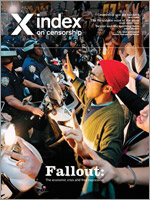26 Mar 2013 | Volume 42.01 Spring 2013

In our increasingly digital times, freedom of expression may look like one of the positive beneficiaries of our ever more interconnected world. Countries like China or Iran build firewalls and employ small armies of censors and snoopers in determined attempts to keep their bit of the internet controlled and uncritical of their ruling elites. But with social media, blogs, citizen journalism, and ever greater amounts of news on a diverse and expanding range of sites, information is shared across borders and goes around censors with greater ease than ever before.
Yet online and off, free speech still needs defending from those in power who would like to control information, limit criticism or snoop widely across people and populations. And it would be a mistake to think the free speech attackers are only the obvious bad guys like China, Iran or North Korea.
While Putin’s Russia jails members of Pussy Riot, passes new laws to block websites and journalists continue to face risks of violent attack, it is Turkey, in 2013, that has more journalists in jail than even Iran or China. In 2004, the European Union assessed Turkey as democratic enough to be a candidate for EU membership. Today, Turkey’s government puts pressure on media companies and editors to rein in critical journalists and self-censorship is rife.
Meanwhile, in the UK, a fully paid-up member of the democracy club, the government and opposition argue over whether Parliament should regulate the print media (“statutory underpinning”, to use the jargon introduced by the Leveson Report into the phone-hacking scandal). On 18 March, the UK’s three main political parties agreed on a new press regulation system whereby an independent regulator would be set up by royal charter. And in this debate over media standards and regulation, the most basic principle, that politicians should not in any way control the press (given their interests in positive, uncritical press coverage), has been too easily abandoned by many. Yet the press faces big questions: what has happened to its standards, how can individuals fairly complain? Similar debates are under way in India, with corruption and the phenomenon of ‘“paid news” among concerns there. Falling standards provide easy targets for those who would control press freedom for other reasons.
Plenty of governments of all shades are showing themselves only too ready to compromise on civil liberties in the face of the large amounts of easily accessible data our digital world produces. Shining a light on requests for information — as Google and Twitter do in their respective transparency reports — is one vital part of the campaigns and democraticdebate needed if the internet is not to become a partially censored, and highly monitored, world.
Google’s recent update of its figures for requests for user data by law enforcement agencies shows the US way ahead of other countries — accounting for over a third of requests with 8,438 demands, with India coming in at 2,431 and the UK, Germany and France not so far behind India.
Both India and the UK have also used too widely drawn laws that criminalise “grossly offensive” comments, leading to the arrest and prosecution of individuals for innocuous social media comments. Public outcry and ensuing debate in both countries is one sign that people will stand up for free speech. But such laws must change.
A new digital revolution is coming, as millions more people move online via their mobiles. As smart phone prices fall, and take-up expands, the opportunities for free expression and accessto information across borders are set to grow. But unless we are all vigilant, whether we face democratic or authoritarian regimes, in demanding our right to that free expression, our digital world risks being a partially censored, monitored and fragmented one. This is the global free speech challenge of our times.

14 Mar 2013 | United Kingdom
The Financial Times, the Guardian, and the Independent this week shifted their position towards a compromise on press regulation. Index criticises the change of stance, which risks threatening press freedom
(more…)
25 Feb 2013 | Uncategorized
Elias Kifle is an Ethiopian journalist who runs a news website, the Ethiopian Review, from his exile in the United States. He is a fierce critic of the Ethiopian government, which is among the top ten “jailers” of journalists worldwide, and he has twice been sentenced to life imprisonment by it — once for treason, in 2007, and once for supposed “terrorism”, in 2012.
Yet, in an unlikely twist of fate, the Ethiopian authorities are not the only ones pursuing him in court: Elias Kifle’s name appears with some regularity in the cause lists of the London libel courts. Although his website is run from the US, publishes to an Ethiopian audience on matters concerning Ethiopia, the London courts have warmly welcomed those who wish to sue him for libel. Prime amongst his pursuers has been Ethiopian-born billionaire, Sheikh Mohamed Al-Amoudi.
Mr Al Amoudi, a businessman so keen to preserve his reputation that his Wikipedia entry has been flagged up as inappropriate because it has been edited by people who have a “close connection” with him, has been granted two default judgments against Elias Kifle: a £175,000 award made in 2010, and a £180,000 award made last week.
Being based in the States and lacking the financial means to hire lawyers, Mr Kifle chose not to defend either of these claims. Last week’s case was allowed to proceed because of Mr Al Amoudi’s business activities and reputation among Ethiopians in London, five of whom gave evidence as having read the piece in question; the fact he is a “frequent visitor” to London; and the fact that Mr Al Amoudi’s children were educated in England. The judge, Mr Justice Eady, does not appear to have considered whether it is even remotely feasible for an Ethiopian journalist exiled in the US and who runs a news website on a shoestring budget to obtain the services of libel defence lawyers. Instead he cites Kifle’s rude responses to Al Amoudi’s lawyers as evidence of Kifle’s intent to wage a “campaign of denigration … without ever having to face [Al Amoudi] in court”.
In many ways, there is nothing new about this — readers of this website will be familiar with the Ukrainian website being sued in London by a Ukrainian oligarch over articles published in Ukrainian; and a few years ago my organisation, the Media Legal Defence Initiative, had to call on the pro bono services of media lawyer Mark Stephens to neutralise a London libel threat against the Nepali Times (which, for the avoidance of doubt, publishes from Kathmandu, Nepal). In both these cases, as in Kifle’s case, the claimants could prove some connection to London — not surprising since most of the world’s nationalities are represented there and the publications in question were accessible online.
But in all these cases, the courts have completely failed to appreciate the difficult position of foreign defendants. Judges don’t appreciate the real chilling effect exerted by the financial cost of defending a libel suit in London (estimated in an Oxford University study reporting as more than a hundred times more expensive in London than elsewhere in Europe). Why should a defendant in the US, Nepal or Ukraine be expected to rack up hundreds of thousands in legal fees (assuming for the moment they have that kind of money in the first place) when they are unlikely to recover this even if they win? And is it really that surprising that an exiled journalist twice sentenced to life in prison displays a certain amount of “scorn” for lawyers and legal proceedings (Mr Justice Eady’s disdain of Elias Kifle and his cavalier attitude to Al Amoudi’s lawyers is evident)? Even if they had a choice — which they do not, because they have no money — many defendants in these matters will prefer to suffer a default judgment, even if that means they will not be able to set up business in London in the future, over certain bankruptcy even if they win a case.
Over the last few years, libel tourism cases have continued to pop up despite international outrage. The US has adopted federal legislation barring the enforcement of English libel judgments — and even allowing for counterclaims — and last year, the Council of Europe adopted a recommendation on libel tourism noting that “[p]rocedural costs may discourage defendants from presenting a defence thus leading to default judgments.”
If the Defamation Bill goes through, the end of the phenomenon of libel tourism may be in sight. Under the new regime proposed by the bill, currently in its final stages in Parliament but in danger of disappearing in the Leveson maelstrom, libel proceedings against foreign defendants cannot proceed unless London is “clearly the most appropriate place in which to bring an action in respect of the statement”. Ministers have made it clear that this means judges must take into account the procedural (un)fairness of requiring a foreign defendant to travel thousands of miles and/or engage lawyers they cannot afford. Let us hope judges will apply this in the spirit it is intended — and let’s hope the bill is enacted; it would mean Elias Kifle’s name will appear in the London cause lists no more.
Peter Noorlander is CEO of the Media Legal Defence Initiative, an organisation that defends journalists’ rights and provides legal aid to journalists around the world
4 Feb 2013 | United Kingdom
 Index on Censorship’s Kirsty Hughes talks to Sir Hugh Orde, one of the UK’s most senior police officers, about protest, public order and politics
Index on Censorship’s Kirsty Hughes talks to Sir Hugh Orde, one of the UK’s most senior police officers, about protest, public order and politics
(more…)



